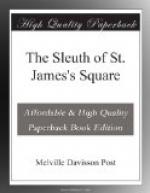The girl turned swiftly, her body erect, her face lifted.
“But this great act,” she cried. “My father, I, all of our blood, are moved by romance — by the romance of sacrifice. Look how my father died seeking an antidote for the pain of the world. How shall I meet this sacrifice of Lord Eckhart?”
Something strange began to dawn in the wide Mongolian face.
“What sacrifice?”
The girl came over swiftly to the table. She scattered the mass of jewels with a swift gesture.
“Did he not give everything he possessed, everything piece by piece, for this?”
She took the necklace up and twisted it around her fingers. Her hands appeared to be a mass of rubies.
A great light came into the Oriental’s face.
“The necklace,” he said, “is a present to you from the Dalai Lama. It was entrusted to Lord Eckhart to deliver.”
XV. Satire of the Sea
“What was the mystery about St. Alban?” I asked.
The Baronet did not at once reply. He looked out over the English country through the ancient oak-trees, above the sweep of meadow across the dark, creeping river, to the white shaft rising beyond the wooded hills into the sky.
The war was over. I was a guest of Sir Henry Marquis for a week-end at his country-house. The man fascinated me. He seemed a sort of bottomless Stygian vat of mysteries. He had been the secret hand of England for many years in India. Then he was made a Baronet and put at the head of England’s Secret Service at Scotland Yard.
A servant brought out the tea and we were alone on the grass terrace before the great oak-trees. He remained for some moments in reflection, then he replied:
“Do you mean the mystery of his death?”
“Was there any other mystery?” I said.
He looked at me narrowly across the table.
“There was hardly any mystery about his death,” he said. “The man shot himself with an old dueling pistol that hung above the mantel in his library. The family, when they found him, put the pistol back on the nail and fitted the affair with the stock properties of a mysterious assassin.
“The explanation was at once accepted. The man’s life, in the public mind, called for an end like that. St. Alban after his career, should by every canon of the tragic muse, go that way.”
He made a careless gesture with his fingers.
“I saw the disturbed dust on the wall where the pistol had been moved, the bits of split cap under the hammer, and the powder marks on the muzzle.
“But I let the thing go. It seemed in keeping with the destiny of the man. And it completed the sardonic picture. It was all fated, as the Gaelic people say . . . . I saw no reason to disturb it.”
“Then there was some other mystery?” I ventured.
He nodded his big head slowly.




